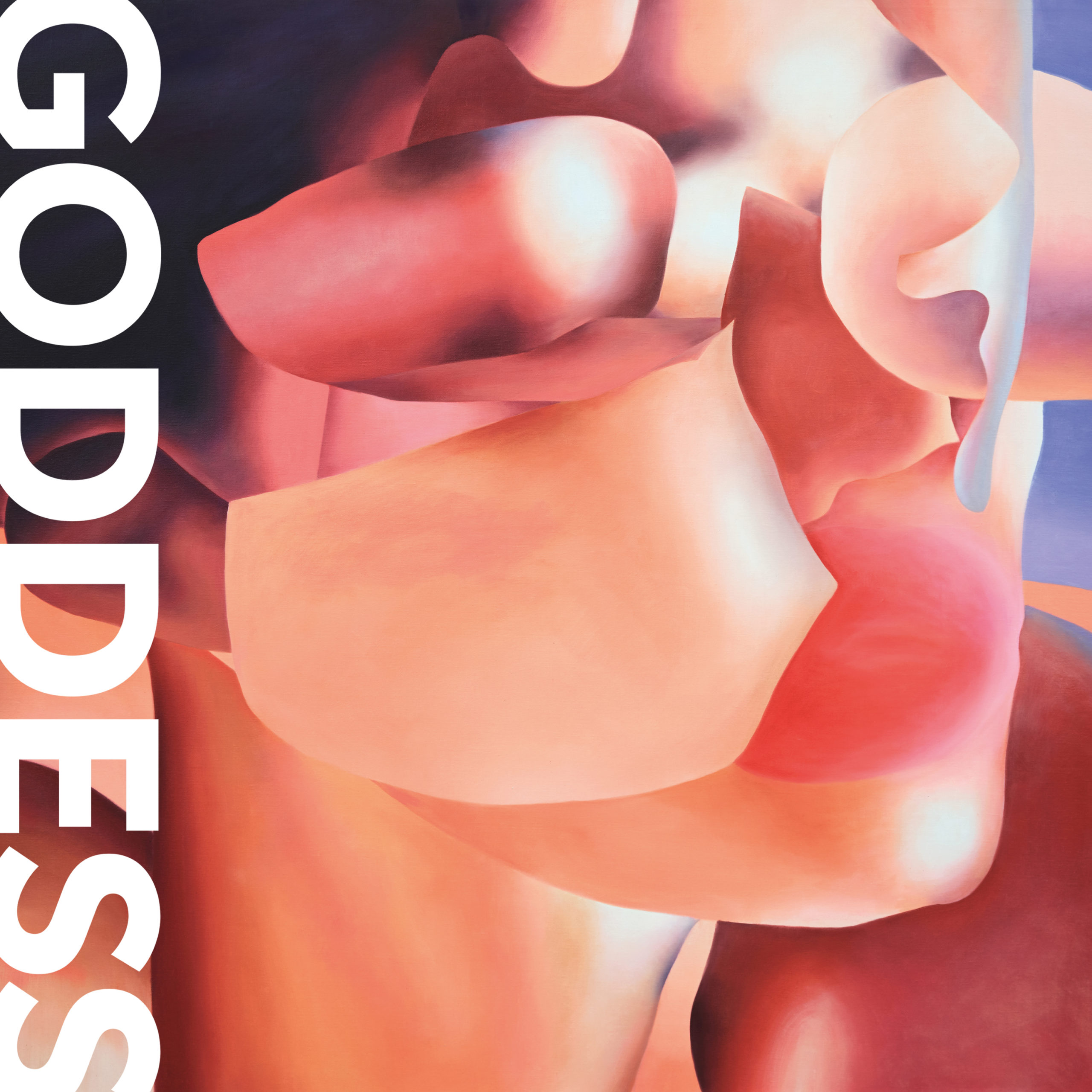
Goddess
—
Release on 30 May 2025
—
Bella Union



The idea to start the multi-pronged musical project that became known as Goddess came to Fay Milton clear-eyed, confident, and fully formed. The band for which she had been the drummer, the much-lauded, two-time Mercury Prize nominated post-punk quartet Savages, were on hiatus, and while she had picked up some session drumming, she felt like she had a larger creative project in her. She knew that she wanted to honor the deep sisterhood that forms when female and non-binary musicians collaborate, and that the project would center the community that she had built in the London independent music scene. There would be emotional range, strength, vulnerability, truth, and joy. There would also be a glimmer of Savages, as she knew her first collaborator would be Ayse Hassan, the band’s bassist, whose thunderous playing has always been the perfect complement to Fay’s ferocious drums. After years of planning, writing, jamming, and recording, Goddess’ self-titled debut is here, released May 30th, 2025 on Bella Union. A 10-track smorgasbord of post-punk, electronica, indie rock, and singer-songwriter, the album is performed by a revolving cast of vocalists, bringing their own unique flavor and flair to each individual track.
There were other deeply personal reasons that Fay sought out a bevy of collaborators for Goddess. She had spent much of the 2010s touring, traveling the world while experiencing the type of professional highs most musicians only dream of. She knew she would continue creating music, but one topic in particular had begun to infiltrate her creative practice, and in doing so, changed the way she approached her craft forever.
“Around the time that Savages went on hiatus, I started thinking about the climate crisis and realizing how existential it is.” This realization led to Fay co-founding the climate activism charity Music Declares Emergency in 2019, whose mission is to give both music industry professionals as well as music fans a platform to demand government action to stop the climate crisis. As Music Declares Emergency began to grow, launching campaigns with artists like Billie Eilish and Radiohead, Fay still found herself pursuing her passion for music and songwriting, but with a totally fresh perspective. How can one engage in the music industry while keeping in mind a commitment to climate activism?
“I couldn’t really justify being someone who continues to jump on a plane every day,” says Fay. With that in mind, thinking about what music project I wanted to do next, I realized that if you’re not planning to do a big tour, that’s a sort of creative parameter that then opens up a lot of freedom. You can have a different singer on every track.” Thus, Goddess was born—sitting squarely at the cross-section of a band, an artist collective, an exercise in collaboration, and a musical manifesto, Fay has created something that is both deeply personal and uses her considerable talent to bring together artists from all over the world to build something bigger than the sum of its parts.
As the project grew, Goddess became about much more than recording an album—it became about finding solace in a world that was becoming increasingly uncertain and calamitous, and providing hope and emotional release through the communal power of creating music. In assembling a crew of artists that inspire her, Fay tapped into the female spirit of open collaboration, a potent salve in dressing the wounds inflicted on us by rampant individualism.
Conceptually, Goddess is somewhat akin to say, Massive Attack or Desert Sessions—a musical experience where genre is more of a guideline than a fixed ethos, where each featured artist is allowed the space and freedom to make their song their own, all while under the guardianship of a visionary leader. Yes, musically Goddess is eclectic, but more than that, it feels as if Fay has been able to connect all these disparate and completely singular vibes into one living, breathing whole, that demands the listener devour every minute in order to appreciate every single interwoven thread.
Goddess opens with “Little Dark”, an intensely droning and emotional ballad sung by Shingai, ex-frontwoman of The Noisettes and one of Fay’s closest friends. Chronicling a late-night walk through London in the aftermath of the pandemic, “Little Dark” balances the crystal-clear harmony of Shingai’s voice with the track’s tenebrous undertones. “We’ve been really close friends for many, many years. We’ve had various late night jams, but had neve seriously sat down to do a song together. It was funny actually, because anyone who knows us knows that we’re both very silly together, but then the song we made is quite deep. It’s not necessarily what our mutual friends would expect. It’s like, ‘Whoa. You guys went deep in the studio!’”
Another longtime friend/first-time collaborator is Elena Tonra, who goes by Ex:Re, and came up with Fay in London as the lead singer of the band Daughter. “She’s also a really close friend,” says Fay. Elena lends her feather-light, knife-sharp vocals to the lead single off of Goddess, “Shadows”, a track that showcases everything that gives the project its unique identity: Fay’s masterful, roiling drumming is tightly embraced by Ayse’s shuddering bass, while composer Hinako Omori’s piano melody twinkles over the top.
“I think “Shadows” is magical,” says Fay, smiling. “I love these songs, in this instance particularly because I love Elena so much. It was a big leap for both of us to go out of our comfort zones to work together. Elena came for a writing session with Ayse and Hinako, all in a room together, and I realized that that was a really big step.”
In “Shadows”, you can hear this tension break, as Elena’s voice cuts through the song’s measured noise and delivers heart-wrenching lyrics about love and loss. “My shadow static by the window/Are you grief? Are you coming for me?” she sings as a sonic tornado swirls around her. “What I love about this track is that it’s got this darkness and lightness at the same time,” explains Fay. “It’s got this real thunder and lightning energy. There’s a very sparkly piano, very light and delicate, and then this noise bass that runs through it. Elena’s vocal is just completely exquisite, as well as her lyrics. And again, her voice has both that light and dark, like a real delicateness, but also it goes quite hard in places as well.”
Two other highlights from Goddess share a similar noise-pop DNA: the R&B-tinged “Animal” and the all-out electro freakout “Fuckboy”. “Animal” features North London DIY icon and singer of feminist punk band Skinny Girl Diet, Delilah Holliday, as she gives voice to the sexy beast within all of us. “Excuse My behaviour/I’m nothing but an animal,” she sings, her voice sultry and low. “And I tend to react when I get the scent.” “Fuckboy” is perhaps the most upbeat, frenetic track on the record, a pulsating slice of industrial rock and electronic dance that features singer/visual artist Salvia, delivering inscrutable lyrics about, well, that one person you really shouldn’t text after a night out. “I mean, we can all relate, right?” says Fay with a chuckle. Two of the main inspirations behind “Fuckboy” are Nine Inch Nails and Sophie, and it shows: the way the beat burrows into your chest is almost scary, and Salvia’s military-grade deadpan demolishes its target with equal parts crazy, sexy, and cool.
That being said, the album is not without its tender moments. “Golden” is a cover of the song “Grande” by the Italian band Afterhours, who are multi-platinum heroes in their home country. “One of my more unusual friends in life is Manuel Agnelli from Afterhours. I ended up going to one of their concerts at this huge arena in Milan. They played “Grande”, which was written about Manuel’s father. It’s a heartbreaking song about death and loss and love. I really wanted to cover it in English so we wouldn’t miss out on the song’s poetry.” “Golden” features vocals by UK singer-songwriter Shadow Stevie, enveloped in a heart-piercing piano melody that swells into crashing horns and drums. It’s equal parts power and vulnerability—the two ingredients of Goddess’ secret sauce.
There are no two vocalists alike on Goddess, this is completely by design. Astute listeners will notice that of the 10 featured singers, all are female/non-binary, which was both a conscious decision on Fay’s part, but also not particularly the focus of the project. It’s a nod to the female representation that has been a through-line in her career, while also simply wanting to showcase the artists that she finds the most exciting. “All of the vocalists I was finding most interesting and inspiring were female and non-binary. Gender is not a topic of the Goddess album in any way, but it is a creative parameter of the project, and a very important one. The album is not about gender, but it’s working with gender as a creative tool.”
At its core, Goddess compiles all of the things that have seen Fay through this new creative chapter of her life, from her eclectic songwriting, to her ever-evolving musicianship, through to her climate activism. One of the most stunning moments on Goddess is the closing track, a cover of the Exuma song “22nd Century”, made famous by Nina Simone in the 1970s. The lyrics, which paint a picture of a planet and human race in distress, are eerily prescient, and perfectly fit within the framework of Goddess.
“I just really wanted to cover that track and bring a new version of it to 2025 because it has so many relevant themes in that song,” she explains. “From the opening line, “There’s no oxygen in the air.” This was written in 1970—people knew about climate issues but it wasn’t anywhere near as serious as it is today. There’s so much there—it’s such an incredible piece of writing.” Goddess’ version of “22nd Century” is performed by singer/visual artist Harriet Rock, and across the seven-minute epic, her voice pleads and cracks, while also giving way to an immense, inner power. Harriet has a powerful voice, and I think the song needed to be carried by someone who can sing really fucking loud. It’s a big rant, almost like someone’s just gone off talking about everything and can’t stop. And by the time you get to the end of it, you’re all a bit like, ‘Oh my God, what just happened?’”
What’s the most striking aspect of Goddess’ isn’t just the fact that the songs are perfectly balanced between enjoyable indie rock and deep, raw emotion, or that 10 different singers were able to all contribute creatively to a project that sounds as cohesive as it is multifaceted. What leaves you at the end of listening to the album is this sense of understanding Fay, and by extension, her collaborators, as artists, each of their identities coming through fully formed. The name Goddess may seem a little omnipotent, but it’s not about being all-knowing, on the contrary–it’s about unapologetically becoming the artist you’re meant to be.